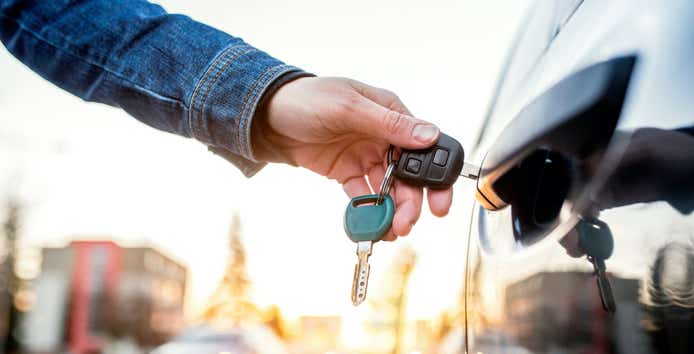Are imported cars more expensive to insure?
An imported car is likely to cost more to insure (and some insurers are wary of imported vehicles so they might refuse to provide cover altogether).
Just the fact that insurers will need to spend more time when calculating how risky your car is can add to the cost.
But the difference might be only marginal, and it mainly depends on what type of car import you have – a grey import or a parallel import – and whether it’s a personal import.
What are the different types of import car insurance?
What are grey imports?
Grey imports are cars that have never been available as standard in the UK, and often don’t conform to government standards. Most grey imports typically come from outside Europe and the most popular are high-spec American or Japanese models.
Grey imports are often the most difficult to insure because:
They cost more to repair as parts are more difficult to get hold of
There’s a higher risk of theft as the cars are more sought after
They often have higher specifications and more powerful engines
They are likely to have been modified.
What are parallel imports?
Parallel imports are cars that have an equivalent UK model.
They are normally not as expensive to insure as grey imports because:
They can be cheaper than cars intended for the UK market.
They tend to comply with UK regulations.
But parallel imports might still have non-standard features, such as being left-hand drive, and this might put up your insurance premiums.
What are personal imports?
A personal import is a vehicle brought to the UK by an individual rather than a dealer.
The impact on your car insurance will depend on whether your personal import is a grey import or a parallel import.
You must tell your insurer if your car is an import – if you’re not sure, check the V5 document.
The car will need to hold a British certificate of insurance before being driven – many standard insurers will be wary of insuring imported cars before they are registered. But there are specialist insurers that deal with personal imports, and they should be able to provide cover for your vehicle while it’s being registered.
How do I buy a personal import?
The most common way to buy a personal import is from a private seller who has previously imported the vehicle.
If you’re buying a car that was brought into the country as a personal import it’s very similar to buying from a private seller. The car will likely already be registered in the UK and all you will have to take care of is the tax and insurance, as you usually would when buying a car
If you’re a UK resident planning to import a car into the country yourself, you will need to register the vehicle in the UK before it is driven.
If you’re registering and insuring the car in the UK, the car will have to be tested under the Individual Vehicle Approval scheme to ensure the car is suitable for use on UK roads. Your imported car will also need to hold a British certificate of insurance before being driven — many standard insurers will be wary of insuring imported cars before they are registered.
There are many specialist insurers that deal with personal imports regularly and will be able to provide cover for your vehicle while it’s being registered.
Are imported Japanese cars cheaper to insure?
Imported Japanese cars are relatively cheap to buy, which is why they are popular, and so their insurance premiums might be slightly lower than other imported cars.
But they are still grey imports, so it will be more expensive to insure a Japanese import than a non-imported car.
Are imported American cars cheaper to insure?
No, imported American cars typically aren't cheaper to insure. They are grey imports, meaning they won’t have been built to UK modifications, so they’ll be more expensive to insure than cars built over here.
Get a car insurance quote
See a range of car insurance quotes in just a few minutes when you compare with Uswitch
How do I get import car insurance?
When a car is imported, HM Revenue & Customs must be told it has arrived within 14 days, and any duty and VAT must be paid if you’re told to.
You’ll need to get approval from the Driver & Vehicle Standards Agency to make sure your car meets safety and environmental standards.
You’ll also need to speak to the DVLA to register the car, and you’ll be given a registration number.
If the car is not a personal import, the good news is that the dealership might have done most of this already.
At that point, you can apply for car insurance by shopping around in the usual way, but don’t forget to tell potential insurers that it’s an imported vehicle.
How can I get cheaper insurance for my imported car?
Because some insurers are wary of providing cover for an imported car, you could try a specialist insurer.
The very fact it’s imported means it’s likely to have some modifications, which can push up the cost of your insurance.
But in general, the things you can do to keep the cost of your insurance down are similar to the things you can do with non-imported cars:
Install safety features, such as an alarm or an immobiliser
Consider telematics (or black-box) insurance
Try to avoid non-essential modifications
Park it in a secure place, such as in a garage or on a drive
Opt for a higher voluntary excess
Shop around and compare quotes from a range of insurers.
FAQs
How do I import a car into the UK?
If you import a car into the UK, you'll need to inform the taxman within 14 days, and pay anything that you’re told is due on the import. It will have to be tested under the government’s individual vehicle approval scheme to ensure it’s suitable for use on UK roads. You’ll then need to register the car with the DVLA. Once you've done all that, you can insure and tax your car as normal.
How much VAT and duty will I have to pay on my imported car?
The amount of duty you’ll have to pay depends on the type of car you’ve bought, and where it’s come from. The amount of VAT you will have to pay depends on the value of the car. If you're buying through a dealership, they should be able to give you the exact figures. If it’s a personal import, HMRC will give you the figures when you tell them about the import.
Do imported cars need a vehicle identification number?
Yes, an imported car does need a vehicle identification number (VIN), which is stamped onto the car’s chassis. You can’t get ‘normal’ car insurance until you have a VIN, although some insurers offer VIN insurance that will cover you until the car one.
Do I have to declare if my car is imported for car insurance?
Yes, you have to tell your insurer that your car is imported. The fact it’s imported will be a factor in how your insurer calculates your premiums. You should always give your insurer the full details of any car you are insuring.




